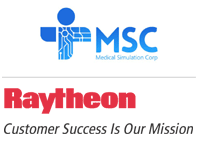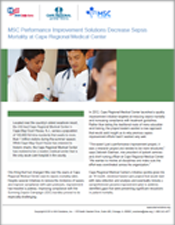Resource:
MSC Performance Improvement Solutions Decrease Sepsis Mortality at Cape Regional Medical Center
Learn from Cape Regional Medical Center's 2012 quality improvement initiative targeted at reducing sepsis mortality and increasing compliance with treatment guidelines.
One thing that had changed little over the years at Cape Regional Medical Center was its sepsis mortality rates. Despite several initiatives to reduce the incidence of sepsis and improve compliance with care protocols, improvement had reached a plateau. Improving compliance with the Surviving Sepsis Campaign (SSC) bundles proved to be especially challenging.
Rather than taking the traditional route of more education and training, the project leaders wanted a new approach that would yield insight as to why previous sepsis improvement efforts hadn’t worked very well.
“This wasn’t just a performance improvement project, it was a research project and needed to be more structured,” says Deborah Baehser, vice president of patient services and chief nursing officer at Cape Regional Medical Center. “We wanted to involve all disciplines and make sure the effort was coordinated across the organization.”
Cape Regional Medical Center’s initiative quickly grew into an 18-month, evidence-based care project that would start with data collection and analysis and eventually include a comprehensive process improvement plan to address identified gaps that were preventing significant reductions in patient mortality.
Seeking additional resources, and a new perspective, Cape Regional Medical Center looked outside the organization for help from MSC (Medical Simulation Corporation), a health care performance improvement company that advances clinical quality and patient safety through implementation and standardization of evidencebased practices. MSC’s methodology and services can be applied to numerous clinical areas, but its proven experience in sepsis performance improvement made MSC the perfect partner. The MSC Sepsis Quality Solution integrates immersive technology, clinical expertise, analytics and practice improvement to advance hospital and health care system sepsis performance for reduced mortality, acuity and cost.
“After our first meeting with MSC we learned that our project would involve much more than MSC providing training,” said Baehser. “It would require much more of a process focus, and MSC could bring process discipline and resources that our medical center didn’t have.” MSC and Cape Regional Medical Center partnered to plan the research phase of the project, which involved multiple stakeholders and data collection on the hospital’s compliance with the SSC bundles for sepsis treatment, as well as sepsis incidence rates, cost of care, morbidity and patient outcomes.
MSC then applied advanced analytics to identify potential trouble areas in Cape Regional Medical Center’s treatment processes. MSC planned and implemented an immersive training program along with process improvements, using insights from its experience with other clients and the SSC guidelines.
“One of the things we learned was that although several groups within our organization were working on sepsis, we weren’t as coordinated as we thought,” said Mary Beth Decredico, who led data collection for the project and at the time was nursing director for a medical/surgical unit.
She is currently Cape Regional Medical Center’s administrative director of maternal child health and medical/surgical units. “One of the reasons we were successful in reducing sepsis this time is that we all received the same online training and simulations from MSC. We also all participated in follow-up assessment to measure the knowledge gained, and reconvened all disciplines to improve our processes.”
As a result of the program, Cape Regional Medical Center has gone beyond incremental improvements to achieve:
- Improved compliance with each element of the sepsis care bundle
- 200 percent overall improvement with SSC Sepsis Guidelines bundles
- 15 percent reduction in sepsis mortality rate
- 31 percent cost reduction
- 37 percent improvement in provider knowledge of evidence-based practices for sepsis
Cape Regional Medical Center and MSC continue to work together to sustain and further improve on these results. Cape Regional Medical Center and MSC jointly presented these results at the 2014 Society for Critical Care Medicine (SCCM) Annual Congress. Cape Regional Medical Center became one of four charter members of the East Coast Sepsis Collaborative to share and promote best practices, and MSC’s Sepsis Quality Solution is available to health care organizations across the country.
“We had done a lot of work in the past, but it wasn’t as well organized or focused as on this project,” said Baehser. “MSC has expertise in project management, which I believe was an important reason why we were so successful in making so many changes and improvements.”

